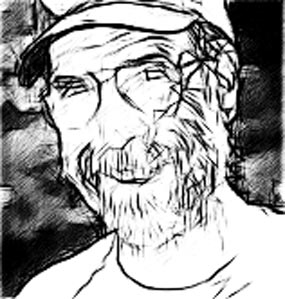transcript edited by Pierce Butler
This is the thirteenth in a continuing series of transcript excerpts from the collection of the Samuel Proctor Oral History Program at the University of Florida.
Pat Fitzpatrick [F], long-time Gainesville community organizer and subject of the documentary Civil Indigent, was interviewed by Isht Vatsa [V] in 2011.
F: I was born in DeLand, Florida in 1949. We moved to Orlando in 1950 when I was one year old, and I stayed in Orlando till I was 19 and joined the Air Force, came back for a couple years to go to college but have been gone for 40 years now.
I went to high school in Orlando, I graduated in 1968. At that time, I ran track and got some scholarship offers. I went to a small school in North Carolina called Brevard. Two things got me. I started smoking – when you run long distances that’s not very good. There were mountains, I had never seen anything higher than a mole hill in Florida, so I didn’t end up being very successful. I quit after one semester and joined the Air Force. Came back and went to college, when I got out in 1974. Got a bachelor’s degree in history from the University of Central Florida, a master’s degree in 1982 from the University of Florida, and a master’s in social work in 1986 from Florida State.
When I got out of college, I didn’t know exactly what I wanted to do. I joined Vista, like the domestic Peace Corps. This is 1976, I had just gotten a divorce, had just graduated, had nothing to do, was actually sitting on a dock fishing sometime so we can eat, it was terrible. Living in my car. I joined Vista because you got a hundred and twenty dollars every two weeks. I also wanted to help people. I spent a year down in the Everglades, working in Immokalee, Clewiston, Morehaven, all around Lake Okeechobee with the migrant farm workers. It was a life-changing experience.
We can go without seeing poverty all our lives because of the segregation of the rich and the poor in this country. I got down and saw this deal with the migrant farm workers. I saw how little they paid them, how hard they worked, and then they had company stores that they went to. You had a lot of people from a lot of different countries I worked with. Guatemalans, Haitians, a lot of Mexicans, people from El Salvador, people from Cuba, people from the other Caribbean islands, St Lucia and all. I saw the situation, and it’s horrifying. I call it brutal poverty.
Continue reading →


